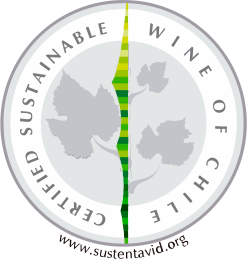Because we love the Earth and its fruits, all of us at Ventisquero are committed to respecting and caring for our environment.
Our production processes are subject to strict quality control and environmental protection standards. The winery voluntarily participated and earned “Certified Sustainable Wine of Chile” status, Chile's first ever sustainability certification created exclusively for the wine industry. Until 2012 this certification covered only the performance of the green area (vineyards), and Ventisquero was the first winery to obtain certification for 100% of its vineyards.

Currently the winery facility and its corporate social responsibility are also evaluated. According to the Wines of Chile assessment, Ventisquero has demonstrated sustainable management in every area involved in the winemaking process: the vineyard, the winery and its production facility, and its social responsibility. For us, the native woodland is a natural resource that should not disappear from our surroundings. For this reason in our day-to-day work we take care to maintain as much woodland as possible and to conserve the ecosystem in our vineyards. We work with a sustainable management plan in our vineyards to mitigate erosion, favouring organic products to control pests and diseases and using controlled watering systems to save and recycle water.
For us, the native forest is a natural resource that should be preserved, that is why every day we are responsible for maintaining the largest amount of forests and ecosystems in our vineyards. We work with a sustainable management plan in order to mitigate erosions, favoring pest control with organic products and controlled irrigation with water supply.
In order to obtain grapes of exceptional quality for our wines, our Research and Development Department seeks to strike the perfect balance between the knowledge gained through studying the land and the tools provided by technology. Over the time years we have developed a series of innovations in our vineyards and our production processes:
• Vine irrigation tests: We are experimenting with the resistance of different rootstock to test their behaviour when irrigated with recycled water.
• Efficient use of water: A. Water-use measurement: Our commitment to sustainability means that we seek to minimize our use of water, taking great care of this valuable resource. We therefore constantly calculate the real water consumption per kilo of grapes produced. B. Irrigation monitoring system: We use cutting-edge technology to measure the effect of irrigation on the plants in our vineyards. We have succeeded in determining the water applied, its effect and the movement of water in the soil.
• Viticultural management: Grapes are our raw material, and we want to protect them at every stage. For this reason we have liberated the foliage from the central wires where the leaves are tethered; this is to create more protection for the grapes against the harsh direct sunlight. We also monitor the grape quality in order to achieve a similar quality level from our different vineyards.
• Precision farming: To determine which variety best adapts to the soil type, we use two mechanisms in our vineyards: the first is a soil analysis device measuring its electroconductivity. The second is the digging of trial pits: these are large holes made in the earth to permit inspection of the soil layers and the growth of the vine’s roots. Collecting this information enables us to do differentiated harvesting within the same block and to vary our irrigation management by soil type for future vintages. It also enables us to identify possible microterroirs in our plots of land.
• Soil and water management: In the Huasco region we are developing different rootstocks that are resistant to salt in different soil conditions, because the vines planted there need to survive in complex, dry and saline conditions.
